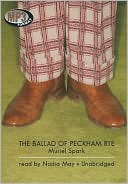

 |

|

The average rating for The Ballad of Peckham Rye based on 2 reviews is 3.5 stars.
Review # 1 was written on 2019-05-25 00:00:00 Jouko Parviainen Jouko Parviainen'There was I,' sang out an old man in the public bar, 'waiting at the church, waiting at the church.' His wife said nothing nor smiled. 'Now then, Dad,' the barmaid said... There must be many ballads about brides abandoned at the altar but none of them could be quite as strange as The Ballad of Peckham Rye. And that's pretty much all I have to say about the story part of this book. If you're interested in what Muriel Spark can do with such an age-old theme, you can read this short book for yourself. I do have a few thoughts about another aspect of this book however. While reading some of Spark's other novels, I'd realised what a fine observer of people's behavior and movements she was, and I began to look forward to her descriptions of characters almost as much as to the stories they found themselves in. While reading this 1960 story, spotting such descriptions became my main focus. The old man in the quote above is a good example. After he'd sung the line about waiting at the church, and been reproved by his wife and the barmaid, each in her own fashion, he took a draught of his bitter with a tremble of the elbow and a turn of the wrist. It's such quick sketches I love to come across. They make the words on the page rise up and form themselves into a picture. Spark's descriptions are often remarkable for their efficiency too. Her characters may babble and blather, and her Peckham people more than most, but Spark can describe their body language with the fewest of words. In a scene where a woman in a Peckham grocer's shop offers a torrent of advice to a new-comer called Dougal, the grocer looked away from the woman with closed eyes and opened them again to address Dougal. Those closed eyes are just so eloquent. Dougal himself is a character capable of an entire dictionary of body language. Soon after arriving in Peckham, he goes for an informal interview, and while the interviewer paces the floor, droning on about his company, Dougal sat like a monkey-puzzle tree, only moving his eyes to follow Mr Druce...Dougal changed his shape and became a professor. He leaned one elbow over the back of his chair and reflected kindly on Mr Druce...Dougal leaned forward and became a television interviewer. Mr Druce stopped walking and looked at him in wonder. 'Tell me, coaxed Dougal, 'can you give me some rough idea of my duties.' Later there's a description of Dougal standing in a hallway, listening to someone talking on the phone: He breathed moistly on the oak panel of the hall, and with his free hand drew a face on the misty surface. We see how bored he is. Nothing needs to be added. Then there's an episode in a Peckham dance hall which could be straight out of a David Attenborough nature documentary. The girls had prepared themselves with diligence, and as they spoke together, they did not smile nor attend to each other's words...Most of the men looked as if they had not properly woken from a deep sleep, but glided as if dragged, and with half-closed lids, towards their chosen partner. This approach found favour with the girls. The actual invitation to dance was mostly delivered by gesture; a scarcely noticeable flick of the man's head towards the dance floor. Whereupon the girl, with an outstretched movement of surrender, would swim into the hands of the summoning partner. After reading this book, I came across the following paragraph in Muriel Spark's autobiography, Curriculum Vitae: I was fascinated from the earliest age I can remember by how people arranged themselves. I can't remember a time when I was not a person-watcher, a behaviourist. Her characters and how they 'arrange themselves' is one of the chief things I will carry away from my long rambling ballade with Muriel Spark. |
Review # 2 was written on 2019-12-19 00:00:00 James Jacobs James JacobsMuriel Sparks playfully takes on the Mephistopheles' theme. A devilish, sexually attractive young man who enjoys getting people to feel the bumps on his forehead where his horns were surgically removed creates mayhem in a small working-class community in Peckham, south London. It begins with a groom at the altar telling the priest no, he will not accept the bride as his lawful wedded wife. The narrative then jumps backwards to provide explanations how he arrived at this maverick decision. This is probably her most bonkers novel. I suspect she had a lot of fun writing it, sped through it but didn't perhaps spend much effort thinking it through. Superficially, it's quite enjoyable but it lacked depth for me. It doesn't ultimately add up to much. That said, there are plenty of fabulous observations and as usual I was impressed by how effortlessly and trenchantly Sparks takes command of her subjects. As writing it's often terrific; as a novel though a bit lame. 3.5 stars. |
CAN'T FIND WHAT YOU'RE LOOKING FOR? CLICK HERE!!!